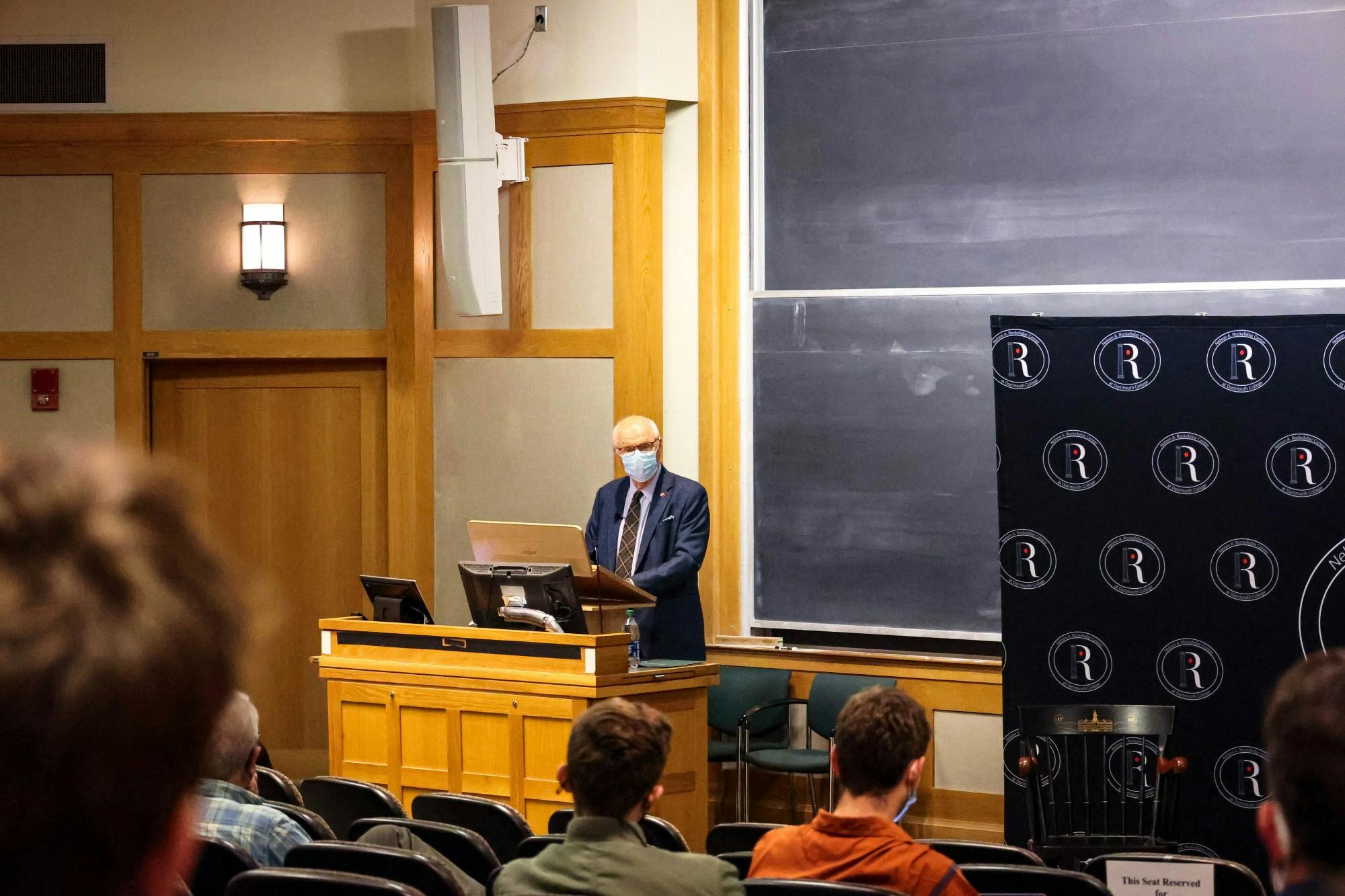President Emeritus and former U.S. Marine James Wright marked Veterans Day by speaking to students on Thursday, Nov. 11 following a flag ceremony on the Green.
At 5 p.m. sharp, the Dartmouth chapter of the Army Reserve Officers’ Training Corps lowered the flag on the Green. Later, some 50 audience members — including many students and alumni veterans — gathered in Filene Auditorium to listen to Wright’s remarks on the changing nature of America’s wars. Government professor Jason Barabas helped to coordinate the event, which was co-sponsored by the Rockefeller Center for Public Policy and the Dickey Center for International Understanding.
Dartmouth ROTC program coordinator Ian Short said it is important to remember that veterans are “fellow citizens” and part of the wider community — especially when considering how “jarring” the transition from federal military service to college life can be for some student veterans.
Before coming to Dartmouth, Colson Sutherland ’22 served in the Air Force for five and a half years. As a staff sergeant, he said that he was stationed in the U.K., the United States, Turkey and Qatar.
“Everyone who serves in the military does so voluntarily and chooses to sign on the dotted line to give up to and including their life in sacrifice for the freedoms that we all enjoy,” Sutherland said.
According to Sutherland, Dartmouth’s Veterans Day programming is “great” but added that “we can do more” as a community to support veterans.
“There are some unique challenges,” he said. “I’ve got a fiancee and a puppy. Sometimes I am in a group project with other students, and they want to meet at 10 p.m.; it can be a challenge to communicate that life is different for some students.”
Sutherland, alongside other students in the Student Veterans Association of Dartmouth College, was in attendance for Wright's speech. Barabas opened the event, noting that Wright joined the Marines at the age of 17 in 1957, and has worked since 2005 to support the post-9/11 GI Bill and wider veteran education.
He added that Wright’s academic research on military history aligns closely with the focus of Veterans Day.
“It’s hard to imagine someone who knows Dartmouth and [the] military community better than President Wright,” Barabas said.
In his initial remarks, which lasted about 40 minutes, Wright explained how war has evolved during the 20th and 21st centuries. He said that the wars in Vietnam, Iraq and Afghanistan looked different than previous wars, such as World War II.
The war in Vietnam marked a turning point, Wright said.
“Combat operations in Vietnam were about engaging an elusive enemy but not about seizing territory,” he said. “There were no iconic flag-raisings; there were no American flags that would fly.”
Wright said that before the Vietnam War, wars focused on “liberating, securing and holding.” Now, he said such strategies might appear alien to veterans of the wars in Iraq and Afghanistan, who primarily focused on eliminating terror or pursuing political goals, rather than holding land permanently.
He elaborated on changes to war technology and fighting style as well as the use of troops as a police or development force instead of a military.
“The final days in Afghanistan provided an example of the difficulty of fighting against forces able to slip in and out of the civilian population,” he said, referring to the suicide bomber who killed 13 American soldiers and dozens of Afghan civilians and injured hundreds of people at the Kabul airport on Aug. 26, 2021.
Wright described the last days of the U.S. presence in Afghanistan as a “microcosm” of the limits of modern military technology and the changing style of war.
“We employed troops not as combat troops but as police, security guards and processors of paper and credentials,” he said. And in the Kabul airport, “no modern technology” could have distinguished friend from foe in the crowd.
The former president then turned to issues within the U.S. military, saying that the all-volunteer force represents less than 0.5% of the U.S. population, and draws heavily from rural areas and small towns in the American South and West.
Wright also criticized the mishandling of issues of racism, racial inequity, sexual assault and sexual orientation within the military.
Vitallia Williams ’22 — who served in the Army for five years before coming to Dartmouth — said that she felt “heartened” and “seen” when Wright acknowledged sexual assault, the lack of diversity and overrecruitment from certain regions within the military.
Williams said that she appreciates Wright’s ability to delve into topics “we are getting wrong” while still acknowledging the civic duty, fidelity and love in the military.
Later in the program, Wright addressed veterans’ human suffering, both in relation to physical wounds and the mental effects of issues like post-traumatic stress disorder.
“Military service obligations are carried out abroad, but the people who serve in those conflicts come home,” Barabas said. “There is a domestic side to these issues.”
Wright said that more veterans have died by suicide in the last 20 years than were killed in Iraq and Afghanistan — but without a military draft, the issue attracts much less attention.
Before a short question and answer session, Wright closed his remarks by imploring others to continue to “stand up and serve.”
In an interview after the event, Wright said that Dartmouth students have long had a “great reputation” for participating in public service.
“I would encourage them to continue to build on that,” he said. “I have a lot of confidence in this generation.”




